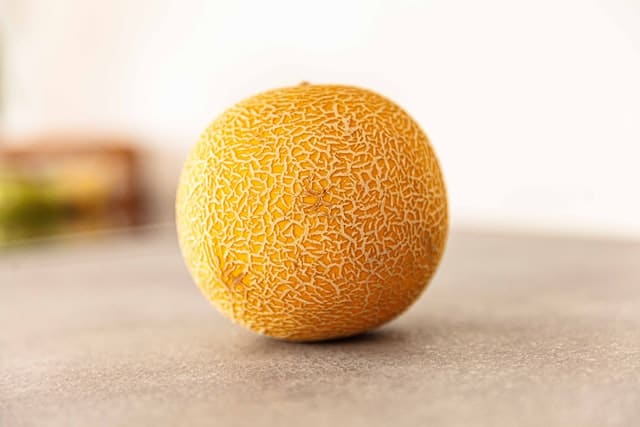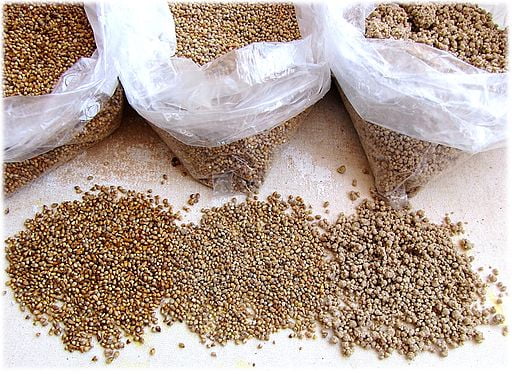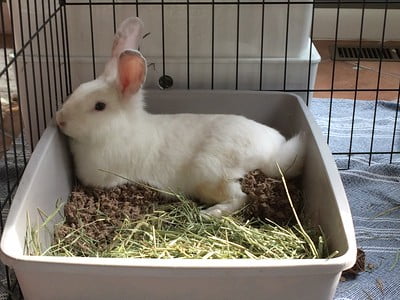Last Updated on March 12, 2023 by Marjon Ramos
Quick Facts About Melon:
- Scientific name – Cucumis melo var. cantalupensis
- Also known as – Casaba Melon, Honeydew Melon, Musk Melon.
- Origin – Africa
- Most commonly found in – Spain, Mexico, and Brazil.
- Average weight – 3.6 kg
You can feed your rabbits melon starting at 7 months old. You should also only give it to them 1-2 times per week. Sticking to this rule would ensure that your rabbit wouldn’t develop digestive problems.
Young rabbits or rabbits that are less than 7 months old are more susceptible to digestive problems when fed sugary treats.
Now that I’ve given you the gist of the article, read on as I explain in more detail why rabbits can eat melon:
Table of Contents
Do rabbits like eating melon?
I’ve asked several of my friends who have rabbits if they’ve ever fed melons to their pets. All of them reported giving melons to their rabbits without causing any problems.
They even reported that their rabbits loved the taste of melons and would immediately gobble them up. In my case, both of my rabbits (Tyr and Freya) loved melons and would get excited whenever they smell them.
Is melon safe to be eaten by rabbits?
Melons are safe to be eaten by rabbits if you stick to the rules I mentioned. Only give melons to your rabbit if they are at least 7 months old and only give small amounts 1-2 times per week.
By doing this, you would considerably lessen the chances of your rabbits developing any digestive problems given that they’re eating their required fiber (hay) for the day.
What are the benefits of feeding melon to rabbits?
To properly understand the benefits of feeding melons to your rabbits, you can use the nutrient constrain calculator below, which shows the different nutrients your rabbits are getting whenever you feed them melons.
It also shows if the amount you’re giving is within the safe nutritional range.
You can also click on the blue icon beside the nutrient to see the benefits and deficiency of each nutrient:
Nutrient Constrain Calculator For Rabbits
Warning:
Although melon has these benefits, overfeeding your rabbit is not recommended. This is only to inform you of the different vitamins and minerals your rabbit can get when you give them melon.
As you can see from the nutrient constrain calculator above, cantaloupe melons are rich in vitamin A.
Is melon good for rabbits?
100 grams of cantaloupe melons contain large amounts of vitamin A. It also contains small amounts of vitamin E, B6, copper, niacin, choline, protein, fiber, calcium, phosphorus, magnesium, and potassium.
All of which provide health benefits to your rabbit if fed in controlled amounts.
Be careful not to feed melons to rabbits that are less than 7 months old. Melons contain starch, which could lead to digestive problems in young rabbits.
How much melon can a rabbit eat?
The proper amount of melons would depend on your rabbit’s age and weight. You can use the diet portion calculator to determine the proper amount of melons (treats) to give your rabbits:
Diet Portion Calculator For Rabbits
If you don’t know your rabbit’s weight, here’s a table that shows the average weight of rabbits based on their breed and how much melons to give:
| Rabbit’s weight based on breed | Allowed melons 1-2 times per week |
|---|---|
| Small breed (1.1–3.5 pounds) | 1 teaspoon |
| Medium breed (6 to 10 pounds) | 1-2 tablespoon |
| Large breed ( 9 and 12 pounds) | 2-3 tablespoon |
The table above assumes that your rabbit is at least 7 months old. Another important variable when deciding how much melons to give your rabbits is their age.
When can rabbits start eating melon?
Here’s a table that shows how much cantaloupe melon to give based on your rabbit’s age:
| Age | Fruits |
|---|---|
| 7 weeks to 7 months | — |
| 7 months to 1 year | No more than 1-2 oz (30-60g) per 6 lbs (2.7 kg) BW |
| Adult (1-5 y) | No more than 2 tbsp per 6 lbs (2.7 kg) BW |
| Seniors (>6 y) | Talk to your veterinarian for a more specialized diet. |
When should you not feed melon to rabbits?

Gist:
Do not give melons to rabbits that are having digestive or dental problems or those that are less than 7 months old.
Melons have a lot of sugar in them. Giving melons to rabbits that are having digestive or dental problems could exacerbate the problems.
The proper protocol whenever you notice or suspect that your rabbits are having digestive problems is to remove any other food from their diet except hay.
This would ensure that your rabbit is getting its required fiber for the day.
Also, rabbits that are less than 7 months old should not be given melons, or any treats for that matter. Young rabbits are susceptible to digestive problems. That’s why they should only stick to a high-fiber diet.
Risk of overfeeding melon to rabbits.
While melons are safe and nutritious for rabbits, there are still risks associated when a rabbit owner overfeeds their rabbits:
- Gastrointestinal Stasis: Overfeeding melons in lieu of hay to your rabbits could lead to GI stasis, which is caused by a lack of fiber in your rabbit’s diet.
- Diarrhea: Diarrhea is also possible when rabbit owners overfeed large amounts of melons to their rabbits too fast. Always introduce any new diet to your rabbits slowly.
- Uneaten cecotropes: Soft uneaten cecotropes are also possible when rabbits are eating large amounts of melons instead of hay. This could lead to softer cecotropes due to the lack of fiber.
- Dental problems: Due to the sugar content of melons, feeding your rabbits large amounts of them could lead to dental problems.
- Obesity: Overfeeding melons to older rabbits, whose metabolism is slower, could lead to obesity due to the high sugar content of melons. Obesity could also lead to uneaten cecotropes, or “poopy bottoms,” because obese rabbits wouldn’t be able to reach their cecotropes to eat them.
Healthy alternatives to melon.
While melons are safe to be given to rabbits, you should still give your rabbits a variety of choices when it comes to their diet, just like what wild rabbits have.
Here are some alternatives to cantaloupe melons that you can give to your rabbits one to two times per week as a treat:
- Nectarine
- Apple (remove seeds)
- Banana
- Papaya
- Peach
- Blueberries
- Blackberries
- Pear
FAQ (Frequently Asked Questions)
Can rabbits eat honeydew melon?
Yes, honeydew melon can be given to rabbits as long as you stick to only giving it to rabbits that are at least 7 months old and you only give it 1-2 times per week in small amounts.
Can rabbits eat Galia melon?
Yes, Galia melon can be eaten by rabbits because it’s just a hybrid between a cantaloupe melon and a honeydew melon. Both of which can be eaten by rabbits as an occasional treat.
Can rabbits eat bitter melon?
Bitter melon, or ampalaya in Asian countries, can be eaten by rabbits and is not on the list of toxic plants for rabbits. But, most rabbits would not eat bitter melon due to its taste and smell. I recommend not giving bitter melon and sticking to the most common diet for rabbits.
Conclusion
Rabbits can eat any type of melons like cantaloupe and honeydew, but only in small amounts, 1-2 times per week. You should also wait until your rabbit is at least 7 months old before giving him any sugary treats like melons.
This would ensure that your rabbit wouldn’t develop digestive problems because young rabbits are more susceptible to it.
Cite this article:
Related Articles
- Can Rabbits Eat Asparagus? 9 things you need to know.
- Can Rabbits Eat Tomatoes? What You Need To Know.
- Can Rabbits Eat Watermelon? What You Need To Know.
- Can Rabbits Eat Grapes? What You Need To Know.
- Can Rabbits Eat Broccoli? What You Need To Know.
- Can Rabbits Eat Apples? What You Need To Know.
- Can Rabbits Eat Cabbages? What You Need To Know.
- Can Rabbits Eat Strawberries? What You Need To Know.
- Can Rabbits Eat Bananas? What You Need To Know.
- Can Rabbits Eat Oranges? 9 things you need to know.
- Can Rabbits Eat Blueberries? Here’s Why.
- Can Rabbits Eat Spinach? Your Questions Answered.
- Can Rabbits Eat Cucumbers? Here’s Why.
- Can Rabbits Eat Celery? What you need to know.
- Can Rabbits Eat Radishes: Everything You Need To Know
Sources
- Melons, raw, cantaloupe
- Patry, Karen, et al. The Rabbit-Raising Problem Solver: Your Questions Answered about Housing, Feeding, Behavior, Health Care, Breeding, and Kindling. Storey Publishing, 2014.
- Digestive disorders
- Health Problems in Rabbits
- Obesity in Rabbits
- BSAVA Manual of Rabbit Medicine




